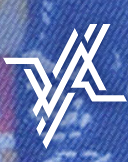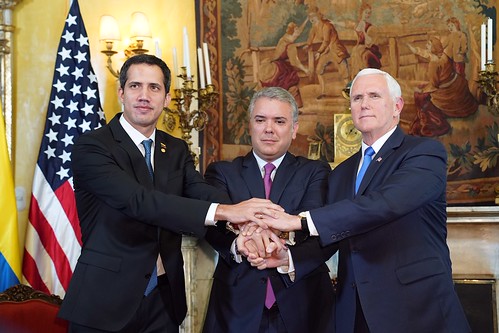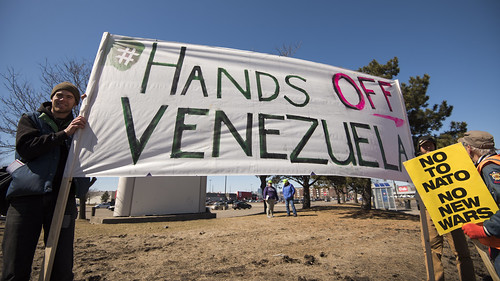After Juan Guaidà � declared himself Venezuelan president on 23 January, the opposition leader immediately sought to legitimise his parallel government by garnering international support. The US, most European states, and large parts of Latin America moved swiftly to recognise Venezuela's new 'interim president' (indeed, US Vice President Mike Pence had already given Guaidà � Washington's blessing), and the opposition leader began announcing his ambassadorial positions before the month's end.
In the time since, however, Guaidà �'s international credibility has suffered a series of blows. Multiple failed coup attempts have forced the 'interim' president back to the negotiating table, and members of his Popular Will (VP) party recently became embroiled in a major corruption scandal. Though the Western media's love affair with the Venezuelan opposition has begun to wane, the US is standing resolute behind Guaidà �, even directing'aid' money designated for Honduras and Guatemala to pay his party's expenses.
Now, therefore, seems an apt moment to look closer at who Guaidà �'s 'ambassadors' are, what they're up to and, crucially, where their money's coming from. In doing so, Guaidà �'s envoys begin to look less like diplomats than regime change lobbyists. And tied to oil, old money, and elite US institutions, they reflect the true essence of the Venezuelan opposition.
Regime change lobby
Tamara SujuTamara Suju, an international human rights lawyer, is Guaidà �'s 'ambassador' to the Czech Republic.
Suju is the executive director of the Czech-based Center for Studies and Analysis for Latin America (CASLA) Institute, whose mission statement is:
to share with Latin-American reformers the finest lessons of democratic and economic transformation in post-communist Europe.
The CASLA Institute is one of numerous projects incorporated within another Czech-based non-government organisation (NGO) named DEMAS. According to its website, DEMAS is supported by the Czech Ministry of Foreign Affairs, the European Union and, vitally, the National Endowment for Democracy (NED).
Known as "America's meddling machine", the NED is a central organisation among numerous US regime change agencies. As lawyer Eva Golinger documented in 2014, the NED and the US Agency for International Development (USAID) have agitated for regime change in Venezuela for well over a decade. Between 2013 and 2014 alone, they pumped over $14 million into Venezuelan opposition groups as violent street protests erupted across the country.
Yet Suju's ties with the US regime-change apparatus go further. The CASLA Institute's website boasts that it is also bankrolled by the NED, as well as Forum 2000 (a 'pro-democracy and human rights' conference, again, funded by the NED). In 2015, the NED awarded Suju a 'democracy' award; she accepted it in person from NED president Carl Gershman.
Guaidà �'s representative in the Czech Republic is also the international coordinator for human rights NGO Foro Penal (Penal Forum), which the US state department has decorated with numerous awards for its work in Venezuela. According to WikiLeaks cables from 2006, Foro Penal has been bankrolled by Freedom House and the Pan-American Development Foundation (PADF) through a USAID-supported project. Foro Penal president Alfredo Romero, meanwhile, has spoken at a "US Democracy Support" forum.
Just two weeks before Guaidà � pronounced himself president, Foro Penal published a damning report on the alleged use of torture in Venezuela. The report was widely circulated in the international press, fanning the flames of "international pressure" already burning around Maduro's feet. More recently, UN human rights chief Michelle Bachelet widely cited Foro Penal's report as if it were a neutral source, demonstrating the revolving door between the human rights industry and the US state department.
To this end, Suju is unsurprisingly connected to a who's who of regime change hustlers masquerading as human rights advocates. In March, Organisation of American States (OAS) general secretary Luis Almagro who broke the OAS charter by recognising Guaidà � as president in January - signed an agreement with Suju, lending OAS support to CASLA as an 'early-warning human rights NGO'.
Elsewhere, Suju rubs shoulders with Human Rights Watch's (HRW) Americas director Jose' Miguel Vivanco, who argued in 2018 that "US/Canada sanctions do not harm the poor". Vivanco also concurred with Joanna Hausmann's (daughter of neoliberal economist and Guaidà � adviser Ricardo Hausmann) observation that: "Hands off [Venezuela] can actually mean 'blood on your hands'".
(Note: You can view every article as one long page if you sign up as an Advocate Member, or higher).







